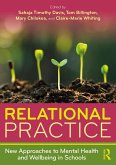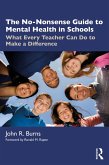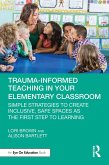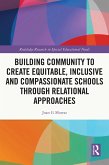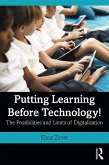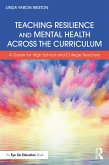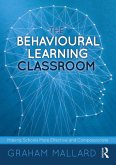Relational Practice: New Approaches to Mental Health and Wellbeing in Schools (eBook, ePUB)
Redaktion: Davis, Sahaja Timothy; Whiting, Claire-Marie; Chilokoa, Mary; Billington, Tom
28,95 €
28,95 €
inkl. MwSt.
Sofort per Download lieferbar

14 °P sammeln
28,95 €
Als Download kaufen

28,95 €
inkl. MwSt.
Sofort per Download lieferbar

14 °P sammeln
Jetzt verschenken
Alle Infos zum eBook verschenken
28,95 €
inkl. MwSt.
Sofort per Download lieferbar
Alle Infos zum eBook verschenken

14 °P sammeln
Relational Practice: New Approaches to Mental Health and Wellbeing in Schools (eBook, ePUB)
Redaktion: Davis, Sahaja Timothy; Whiting, Claire-Marie; Chilokoa, Mary; Billington, Tom
- Format: ePub
- Merkliste
- Auf die Merkliste
- Bewerten Bewerten
- Teilen
- Produkt teilen
- Produkterinnerung
- Produkterinnerung

Bitte loggen Sie sich zunächst in Ihr Kundenkonto ein oder registrieren Sie sich bei
bücher.de, um das eBook-Abo tolino select nutzen zu können.
Hier können Sie sich einloggen
Hier können Sie sich einloggen
Sie sind bereits eingeloggt. Klicken Sie auf 2. tolino select Abo, um fortzufahren.

Bitte loggen Sie sich zunächst in Ihr Kundenkonto ein oder registrieren Sie sich bei bücher.de, um das eBook-Abo tolino select nutzen zu können.
A clear and compelling text written by teachers, psychologists and educationalists, this book advocates a movement away from the medicalised mode of mental health, instead embracing a dynamic and relational approach to supporting the mental health needs of children and young people within education.
- Geräte: eReader
- mit Kopierschutz
- eBook Hilfe
Andere Kunden interessierten sich auch für
![Relational Practice: New Approaches to Mental Health and Wellbeing in Schools (eBook, PDF) Relational Practice: New Approaches to Mental Health and Wellbeing in Schools (eBook, PDF)]() Relational Practice: New Approaches to Mental Health and Wellbeing in Schools (eBook, PDF)28,95 €
Relational Practice: New Approaches to Mental Health and Wellbeing in Schools (eBook, PDF)28,95 €![The No-Nonsense Guide to Mental Health in Schools (eBook, ePUB) The No-Nonsense Guide to Mental Health in Schools (eBook, ePUB)]() John R. BurnsThe No-Nonsense Guide to Mental Health in Schools (eBook, ePUB)30,95 €
John R. BurnsThe No-Nonsense Guide to Mental Health in Schools (eBook, ePUB)30,95 €![Trauma-Informed Teaching in Your Elementary Classroom (eBook, ePUB) Trauma-Informed Teaching in Your Elementary Classroom (eBook, ePUB)]() Lori BrownTrauma-Informed Teaching in Your Elementary Classroom (eBook, ePUB)21,95 €
Lori BrownTrauma-Informed Teaching in Your Elementary Classroom (eBook, ePUB)21,95 €![Building Community to Create Equitable, Inclusive and Compassionate Schools through Relational Approaches (eBook, ePUB) Building Community to Create Equitable, Inclusive and Compassionate Schools through Relational Approaches (eBook, ePUB)]() Joan G MowatBuilding Community to Create Equitable, Inclusive and Compassionate Schools through Relational Approaches (eBook, ePUB)42,95 €
Joan G MowatBuilding Community to Create Equitable, Inclusive and Compassionate Schools through Relational Approaches (eBook, ePUB)42,95 €![Putting Learning Before Technology! (eBook, ePUB) Putting Learning Before Technology! (eBook, ePUB)]() Klaus ZiererPutting Learning Before Technology! (eBook, ePUB)26,95 €
Klaus ZiererPutting Learning Before Technology! (eBook, ePUB)26,95 €![Teaching Resilience and Mental Health Across the Curriculum (eBook, ePUB) Teaching Resilience and Mental Health Across the Curriculum (eBook, ePUB)]() Linda Yaron WestonTeaching Resilience and Mental Health Across the Curriculum (eBook, ePUB)28,95 €
Linda Yaron WestonTeaching Resilience and Mental Health Across the Curriculum (eBook, ePUB)28,95 €![The Behavioural Learning Classroom (eBook, ePUB) The Behavioural Learning Classroom (eBook, ePUB)]() Graham MallardThe Behavioural Learning Classroom (eBook, ePUB)24,95 €
Graham MallardThe Behavioural Learning Classroom (eBook, ePUB)24,95 €-
-
-
A clear and compelling text written by teachers, psychologists and educationalists, this book advocates a movement away from the medicalised mode of mental health, instead embracing a dynamic and relational approach to supporting the mental health needs of children and young people within education.
Dieser Download kann aus rechtlichen Gründen nur mit Rechnungsadresse in A, B, BG, CY, CZ, D, DK, EW, E, FIN, F, GR, HR, H, IRL, I, LT, L, LR, M, NL, PL, P, R, S, SLO, SK ausgeliefert werden.
Produktdetails
- Produktdetails
- Verlag: Taylor & Francis eBooks
- Erscheinungstermin: 1. Oktober 2024
- Englisch
- ISBN-13: 9781040121269
- Artikelnr.: 72279085
- Verlag: Taylor & Francis eBooks
- Erscheinungstermin: 1. Oktober 2024
- Englisch
- ISBN-13: 9781040121269
- Artikelnr.: 72279085
- Herstellerkennzeichnung Die Herstellerinformationen sind derzeit nicht verfügbar.
Sahaja Timothy Davis is a practitioner, teacher, and researcher of mindfulness and non-duality who has contributed to national and international research projects, conferences, and publications in these areas. He is also the co-director for the doctorate in child and educational psychology at the University of Sheffield. Tom Billington is Emeritus Professor of educational and child psychology at the University of Sheffield (UK) and is a fellow of the British Psychological Society. His work as a practitioner has driven his research, utilising critical approaches to developmental psychology that accord with principles of equality, diversity, and social inclusion. Mary Chilokoa is a practising educational psychologist working in Leeds Educational Psychology Service. She is an academic tutor on the doctoral course in child and educational psychology at the University of Sheffield and has published in the areas of peer supervision and pupil 'voice'. Claire-Marie Whiting is a specialist educational psychologist for participation and engagement at Rotherham Educational Psychology Service. She is the co-lead for 'Genuine Partnerships', a group of practitioners, parent carers, and young people who model and support co-production and inclusive practice. Claire is also the director of placements and a course tutor for the educational psychology doctorate at the University of Sheffield.
1. Working relationally: A paradigm choice; 2. Humanizing our Practice: The
Radical Possibilities of a Relational Approach; 3. Psychosocial justice: a
matter of ecologics; 4. An inquiry into the heart of separation, selfhood,
connection, and love: The implications of non-duality to relational
practice; 5. 'I am because we are': African and Buddhist perspectives on
'relationship' and human flourishing; 6. Personal selves, professional
lives: Engaging the 'self' in work with families and young people; 7.
"There's TRUST there at the heart of it"; 8. A reflection on how a
relational approach supported an Educational Psychology Service's work on
antiracism; 9. Exploring the relational power of Appreciative Inquiry:
drawing on previous experiences and diverse perspectives within an
Educational Psychology Service to create new ways of working; 10. What
works to create a supportive relational culture that enhances staff
wellbeing?; 11. "It's all about relationships"; 12. Children in care
proceedings: trauma, commitment and relational practice in schools; 13.
Supporting Neuro-diverse LGBTQ+ Students to Thrive; 14. Emerging Adulthood
and Working with Uncertainty - A Multi Agency Perspective; 15. REFLECT: A
collaborative and reflective relational approach that empowers adults to
better understand and nurture, and children and young people to flourish;
16. The role of intersubjective processes and the impact they have on
relationships in educational settings; 17. Special time: An intervention to
support the building of teacher-pupil relationships to promote belonging,
trust and development of positive attachments with school staff; 18. Beads
of Life for transition to High School: Educational and Child Psychologists'
re-telling their embodied narrative practice with young people, staff and
families; 19. Winnicott's Relational Wisdom: Playing in the Space Between
Radical Possibilities of a Relational Approach; 3. Psychosocial justice: a
matter of ecologics; 4. An inquiry into the heart of separation, selfhood,
connection, and love: The implications of non-duality to relational
practice; 5. 'I am because we are': African and Buddhist perspectives on
'relationship' and human flourishing; 6. Personal selves, professional
lives: Engaging the 'self' in work with families and young people; 7.
"There's TRUST there at the heart of it"; 8. A reflection on how a
relational approach supported an Educational Psychology Service's work on
antiracism; 9. Exploring the relational power of Appreciative Inquiry:
drawing on previous experiences and diverse perspectives within an
Educational Psychology Service to create new ways of working; 10. What
works to create a supportive relational culture that enhances staff
wellbeing?; 11. "It's all about relationships"; 12. Children in care
proceedings: trauma, commitment and relational practice in schools; 13.
Supporting Neuro-diverse LGBTQ+ Students to Thrive; 14. Emerging Adulthood
and Working with Uncertainty - A Multi Agency Perspective; 15. REFLECT: A
collaborative and reflective relational approach that empowers adults to
better understand and nurture, and children and young people to flourish;
16. The role of intersubjective processes and the impact they have on
relationships in educational settings; 17. Special time: An intervention to
support the building of teacher-pupil relationships to promote belonging,
trust and development of positive attachments with school staff; 18. Beads
of Life for transition to High School: Educational and Child Psychologists'
re-telling their embodied narrative practice with young people, staff and
families; 19. Winnicott's Relational Wisdom: Playing in the Space Between
1. Working relationally: A paradigm choice; 2. Humanizing our Practice: The
Radical Possibilities of a Relational Approach; 3. Psychosocial justice: a
matter of ecologics; 4. An inquiry into the heart of separation, selfhood,
connection, and love: The implications of non-duality to relational
practice; 5. 'I am because we are': African and Buddhist perspectives on
'relationship' and human flourishing; 6. Personal selves, professional
lives: Engaging the 'self' in work with families and young people; 7.
"There's TRUST there at the heart of it"; 8. A reflection on how a
relational approach supported an Educational Psychology Service's work on
antiracism; 9. Exploring the relational power of Appreciative Inquiry:
drawing on previous experiences and diverse perspectives within an
Educational Psychology Service to create new ways of working; 10. What
works to create a supportive relational culture that enhances staff
wellbeing?; 11. "It's all about relationships"; 12. Children in care
proceedings: trauma, commitment and relational practice in schools; 13.
Supporting Neuro-diverse LGBTQ+ Students to Thrive; 14. Emerging Adulthood
and Working with Uncertainty - A Multi Agency Perspective; 15. REFLECT: A
collaborative and reflective relational approach that empowers adults to
better understand and nurture, and children and young people to flourish;
16. The role of intersubjective processes and the impact they have on
relationships in educational settings; 17. Special time: An intervention to
support the building of teacher-pupil relationships to promote belonging,
trust and development of positive attachments with school staff; 18. Beads
of Life for transition to High School: Educational and Child Psychologists'
re-telling their embodied narrative practice with young people, staff and
families; 19. Winnicott's Relational Wisdom: Playing in the Space Between
Radical Possibilities of a Relational Approach; 3. Psychosocial justice: a
matter of ecologics; 4. An inquiry into the heart of separation, selfhood,
connection, and love: The implications of non-duality to relational
practice; 5. 'I am because we are': African and Buddhist perspectives on
'relationship' and human flourishing; 6. Personal selves, professional
lives: Engaging the 'self' in work with families and young people; 7.
"There's TRUST there at the heart of it"; 8. A reflection on how a
relational approach supported an Educational Psychology Service's work on
antiracism; 9. Exploring the relational power of Appreciative Inquiry:
drawing on previous experiences and diverse perspectives within an
Educational Psychology Service to create new ways of working; 10. What
works to create a supportive relational culture that enhances staff
wellbeing?; 11. "It's all about relationships"; 12. Children in care
proceedings: trauma, commitment and relational practice in schools; 13.
Supporting Neuro-diverse LGBTQ+ Students to Thrive; 14. Emerging Adulthood
and Working with Uncertainty - A Multi Agency Perspective; 15. REFLECT: A
collaborative and reflective relational approach that empowers adults to
better understand and nurture, and children and young people to flourish;
16. The role of intersubjective processes and the impact they have on
relationships in educational settings; 17. Special time: An intervention to
support the building of teacher-pupil relationships to promote belonging,
trust and development of positive attachments with school staff; 18. Beads
of Life for transition to High School: Educational and Child Psychologists'
re-telling their embodied narrative practice with young people, staff and
families; 19. Winnicott's Relational Wisdom: Playing in the Space Between

